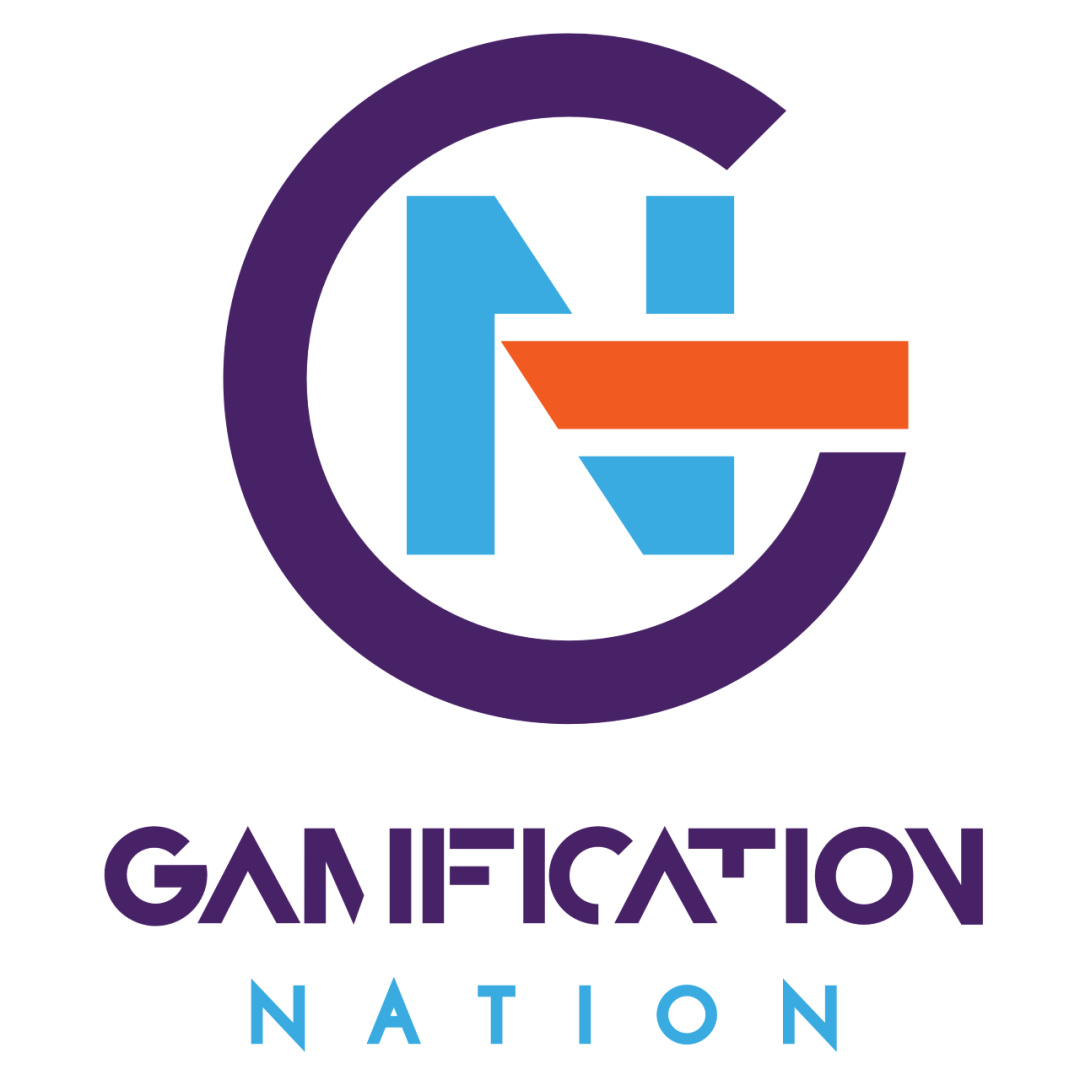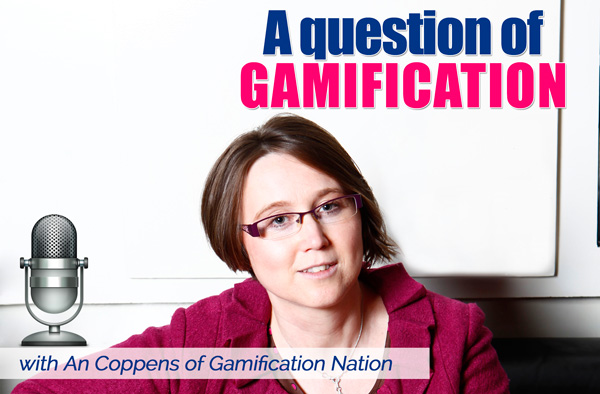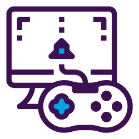Welcome to this week’s A Question of Gamification. Welcome to this show. My name is An Coppens. I’m the show host, and also the CEO of Gamification Nation, and I first of all have to apologise for my absence. We wanted to make this a weekly show and guess what happened? I lost my voice, so it’s taken a while to get back on track, and it’s still not 100%, but it’s good enough so that I can record a new episode for the podcast. I missed talking to you, but I also was glad to let the body heal, and do what it needs to do to get better.
This week’s question of the week is an interesting one. It’s one that we had to deal with recently, so how can you extract information out of learning teams that are useful for game designers, and then how do you use that information to make it into a game? So it’s maybe a double edged question. So on one side, how do you get the information out of learning teams inside a corporate sector? And then how do you make sense of it so that it actually makes sense to make a game with?
Recently we won a project and it very much involves a lot of game design around new content. So it’s learning based games but around new content for the organization. And in order to get to a base level, we obviously need the organization to tell us what kind of topics they want to cover, what kind of subjects their people need to learn, et cetera. So that was sort of a given a baseline. So then we went looking and I said to my guys, I said, “Look, what would work well from our perspective is if we followed a very basic learning design model, which I learned way early in my training career, and it’s called the KASH model, you see it for people talking about performance related training, et cetera.”
And typically it’s used in the context of making training linked to actually translating it into day-to-day on the job work habits. So KASH stands for knowledge, attitudes, skills and habits. And the whole theory behind it from a learning thinking perspective is first of all you need knowledge. Then you need the attitude to want to learn and absorb that knowledge, and then the attitude to apply it and also practice the skills that relate to the same knowledge. Because knowledge without implementation might as well, I think there is a saying, not mine but somebody else’s, that says to know and not to do is not to know. Something along those lines. In any case, I heard it several times in my career of training in the NLP sector, the Neuro-linguistics.
So KASH, easy to understand, easy to remember, but also actually very useful from a game design perspective. Because when we’re thinking about learning related games, the first thing that always comes up, oh we need to quiz. Now a quiz, whilst it has its purpose and it’s really good and very effective, it’s also one of the most overused game types for knowledge testing. The other way of spreading knowledge is to make people curious and to have hidden elements that you have to unlock or crack a code or solve a more difficult scenario in order to unlock the knowledge that they need to learn, the knowledge that they need to use for whatever new skill it is.
So knowledge tests are easily translated into games, whether that is finding stuff, whether that is creative repurposing of let’s say an arcade game or traditional games that you played when you were younger. Even simple games like Mario Runner, crosswords, different types of puzzles, they can all be made into knowledge related games and knowledge related tests, so to speak. Attitude is something not in a game and in a reality is something how you show up.
Now from a game design perspective, that’s really interesting. Your character can always have a positive and a negative side and depending on the circumstance it can choose to play either way. So if you’re thinking in the role playing game style of game, you have the option to choose the rebel who doesn’t do anything they’re being told or know to do or know that’s right. And see how that works. But you also could have goody two shoes that does everything by the book as they’re told, and see if that works, or anywhere in between.
So attitude is something you can bring into a game environment, which you don’t necessarily have the ability to do in let’s say classroom or online learning. So I think that’s where games can add the bonus in order to be more impactful than let’s say … Or add to what you’ve already taught in the classroom or in an online course. So attitude is the second piece.
Then skills is something that you repetitively practice. Now a lot of games, like if you think about games like Candy Crush or Angry Birds, there is a lot what they say grinding involved, so repetitive actions before you can level up. And that in effect is skills practice, because think about it, wherever you ended up in the higher up levels of a casual game meant that you’ve had to repeat the base skill or finding jewels, hitting pigs, whatever the case may be. You learned that and you learned that to quite a deep extent. So you could probably go back to level one and ace that nearly with your eyes closed. Because you’ve learned this skill over time. As you get better, the level should be more challenging and you may have things that are thrown at you that are different.
So the skills level then needs to go up as well and not maybe steadily up, but gradually up. A bit of resting time, gradually up, a bit of resting time, so that you have a chance to embed the new skills each and every time. The habits side of KASH, again you can build game mechanics to build habits. Now in a game environment, what we often see is things like log in streaks or winning streaks, or having to play something every day in order to keep your winning streak. For example, Duolingo uses that to great effect. Things like progression bars, things like different elements that allow you to basically progress, but also encourage you to do a little bit every day.
Reminders, notifications, social peer-to-peer pressure often are the habit building factors that help somebody stick with a game and can equally work in a learning environment. So I would say the KASH framework, although it’s very basic and it’s not necessarily an instructional design framework like an ADDIE or a Bloom’s taxonomy, but it actually offers you all the elements you need in order to translate a topic from what is it that people need to know, what do they need to be able to do? How do they need to show up? And what habits are effective over time that help them level up their general game?
So from translating learning to game design, actually that works quite neatly. The other thing that we all start trying to do was then to look at, so our beginner level, what does KASH look like? What does the knowledge they need to have look like? What is the skills they need to have? The base level? What are the attitudes you typically see at that point and what are the habits you would need to learn and build?
And from some of our very successful gamification programs we know that if we model the habits of very successful people in the organization for new beginners and new starters in the organization, it allows us to sort of map out, “Okay, what are the key things that people need to learn?” And then we reinforce the things that they need to learn and do regularly with rewards, with celebrations, with positive reinforcing messages, et cetera. So it works both for gamification and game design.
So how do you translate a topic area into something that you could work with for game design? Well, it’s called KASH, K-A-S-H. So knowledge, attitude, skills and habits. Knowledge can be translated into knowledge based games, learning games. Attitudes you can make a character around that. Be creative in terms of the gameplay and build that in. Skills is the repetition of a particular skill that they need to master. And then habits are things that you build in game accounting so it encourage people, positive reinforcements, rewards, milestones, having streaks that are valuable if you keep them, and you lose something if you don’t keep up the good work.
So I hope that gives some people some ideas, some inspirations on how you can make effective learning games from even just a one liner topical piece. Thank you for listening and if you want just to help you with your work, by all means book a strategy session. That’s probably the quickest way to see if we can help you. And then let’s go from there. Thanks very much for listening.




